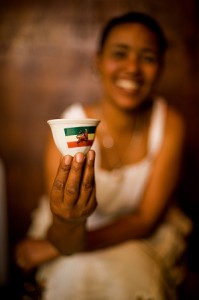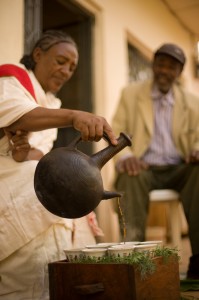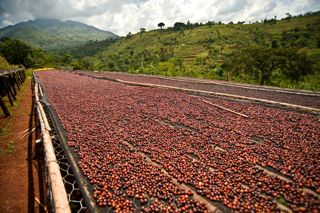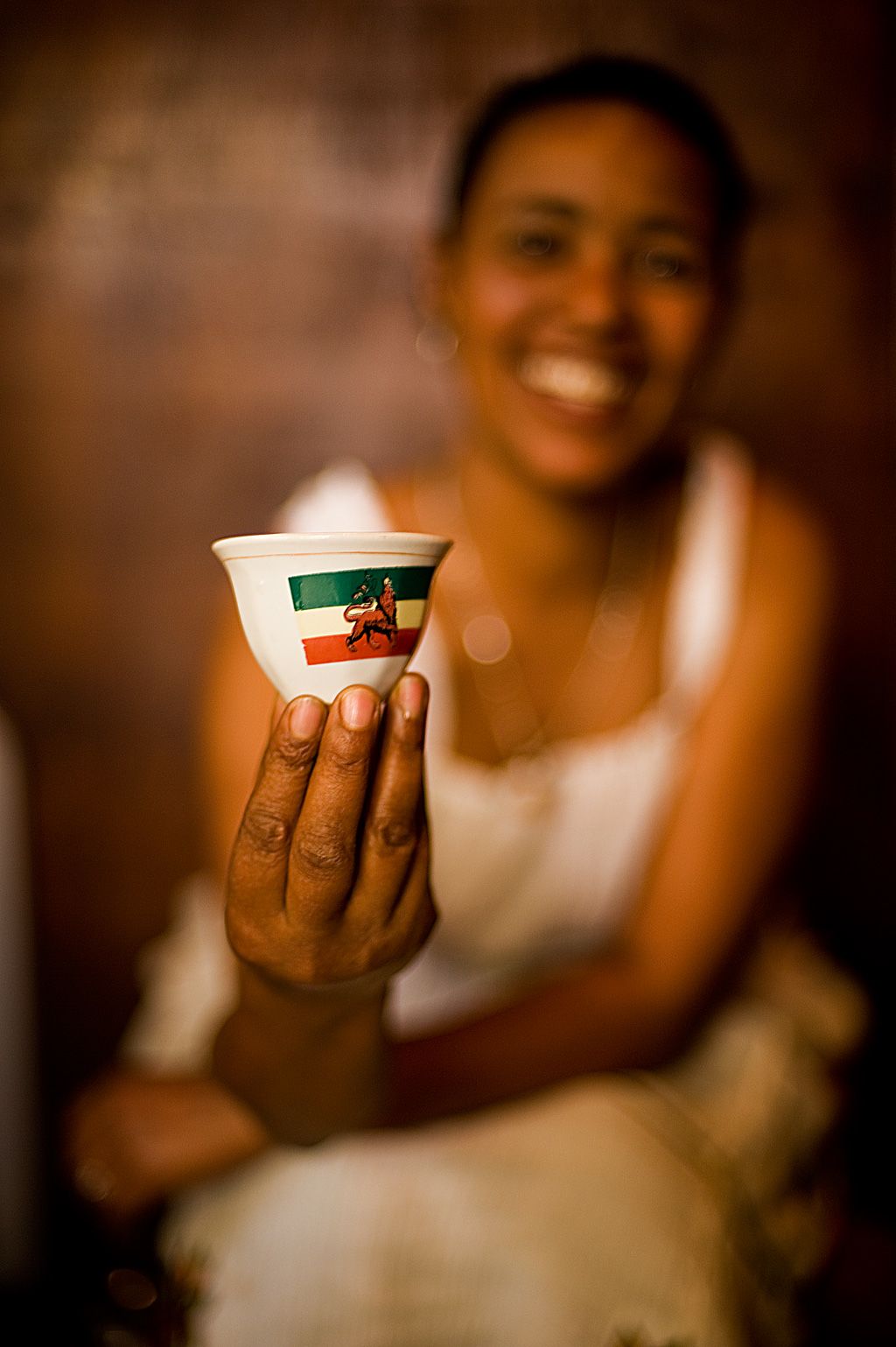
Coffee in Addis Ababa, Photo by Travis Horn
Coffee can erase a famine.
Agree? Disagree? Wonder just how literally I mean for that statement to be? How about this one:
Coffee can create greater global understanding.
If you’re reading this, you’re involved with coffee. If more than one billion cups of coffee are consumed every day in our world, then it is virtually impossible to avoid an association with the beverage. I’d wager we’d all like to see that association go even deeper. I’d like it to change the world. Let’s do it together, and let’s start with Ethiopia.
(Read Majka’s call to action to the coffee community in the Specitaly Coffee Association of America’s Chronicle below, or via the PDF)
If you ask 10 people who walk into a café for three words to describe Ethiopia, drought famine and poverty will inevitably come up immediately. Inside the coffee world we know a different side of Ethiopia. So how do we better share it?
Six years ago, I went to Ethiopia on a lark due to a free latte. I never meant for coffee to be anything profound in my life. But Ethiopia had other plans. What I have discovered in researching, writing, and speaking about my recent book, Coffee Story Ethiopia (Ninety Plus Press/Shama Books) is Ethiopia’s incredible hold on global imagination—and the power of coffee to enrich that perception.
It was an eight-year-old girl who started me on the path to understanding this power. I met her at the base of a cluster of 500-foot tall sanguine sandstone towers in Northern Ethiopia. I was at the towers during my second visit to Ethiopia, there then to climb and write another book, Vertical Ethiopia, about adventure in Ethiopia. When the girl learned I was a writer, and writing about her country, she asked me a question: Are you going to tell a good story? Or a bad story?

Photo by Travis Horn
The girl and I had been hiking through terraced fields dotted with dried out barley stalks when she asked me the question. I stopped and stood still in 95-degree heat in the heart of the northern desert landscape of Ethiopia and thought about my answer. I was in Tigray—the very place hardest hit by the cataclysmic famine of 1984. The mother of this little girl had not even been alive during that famine, and yet her daughter knew the impact of that disaster on Ethiopia’s image in the world. Good story or bad? I told the girl the truth: I didn’t know the answer yet, but I would try to tell the good.
Coffee is the way to tell the good story. This became clear for me as I went on to tell a story about adventure. Two years and fifty presentations about Ethiopia later I had learned one thing again and again: though people were intrigued to know about exploration and rock climbing in Ethiopia, what they really wanted to know about was the coffee.
Drought, famine and poverty are consummate negative trifecta descriptors for Ethiopia. This has to do, in part, with a legacy of all three, but it also equally has to do with the way in which our world has fixated on those descriptors for this region. Those in the coffee world undoubtedly have another association for Ethiopia—that of coffee and the potential for more and better coffee. But how often are we intersecting coffee with the negative trifecta? And could we do it more to help consumers expand their understanding of coffee and change their view of Ethiopia?
This past summer the news from the Horn of Africa was horrific: Drought and famine spreading throughout the region, exacerbated by the derailment of aid shipments by the militant group al-Shabab, resulting in tens of thousands of deaths with little resolution in sight. As global citizens we needed to know all of that. But I’m worried about the way we learned it—from reports with the news truncated the same way I just presented it. Though the facts may be accurate, their wholly negative and abbreviated presentation unwittingly creates a future for the region that is overly linked with its past. Ethiopia and its peoples are still struggling to emerge from the identity formed during the 1984 famine. The very crisis that created Live Aid and all that came with it had good results for Ethiopia alongside an abysmal branding of the country as helpless and ever-starving. The recent famine itself was worse and thus the collateral identity damage after the famine could also be worse if we don’t do something about it now. Coffee can change the conversation and help create a new future.

Amaro Mountains. Photo by Travis Horn
Coffee paints a different picture of the Horn: one with bucolic valleys and lush mountainsides, century old coffee forests, and people living in agricultural bounty. The coffee world is not a perfect world in Ethiopia, but the raw abundance of the coffee lands and the deeper possibility that is increasing daily in Ethiopia makes it the exact opposite of the negative trifecta. This abundant Horn exists, but is entirely absent from today’s news. The impact of this absence is apathy. Coffee can tell the good story. And we can do it, uniquely, in Ethiopia because of the culture of coffee beyond the commodity.
Coffee as a Barrier to Paradise
Picture this: You are devoutly religious. You live in the land of the arc of the covenant. Your country is the birthplace of coffee. And your god says you can’t drink coffee. Gebru Kidame is a man who grew up abiding by this rule because his parents and church told him that if he drank coffee, he would not make it to paradise. Proof came in the following story, as told by Gebre:
“Back when Jesus died, it was the time of the great sacrifice. Everything mourned for Jesus then—the rivers were dry, the wind still, and the trees were dry. There were no flowers, seeds, or leaves
Except for coffee. Coffee was the only plant that did not cry for Jesus.”
Gebru told me this story over a cup of coffee. The irony was not lost on him. We even had another cup to celebrate the irony. By then he’d been drinking coffee for twenty years—since he’d become an adult. People change their ways, he explained to me, but not their stories.
Ethiopia is rife with coffee stories. It has to be—this is the birthplace of Coffee arabica with 10,000 varieties growing from her soil. Moreover, this is a land where coffee legends go back 3,000 years to the Queen of Sheeba and are expressed in over 200 dialects of 80-plus languages. When I started collecting stories about the culture of coffee I quickly realized every person, in every tribe, in every region, in every room, had their own coffee story to tell.
Coffee origin legends are some of the most compelling—and most conflicted—across this 1.1 million square kilometer land. According to some, coffee comes from the bathwater of Prophet Muhammad’s grandsons. Their mother, having finished bathing them, tossed the water out the window and woke up the next day to a coffee forest. Others believe an Ox first found coffee. As for a story about a goat and some person named Khaldi? That story stretches thickly throughout the world and thinly in Ethiopia. In the early 1900’s it was a well-known story in Europe and nowhere to be found in Ethiopia. The story has made it back to Ethiopia in the past 100-plus years and today, if you listen close enough, you can find Khaldi as a prankster or a monk, a Muslim or a Christian, a scholar or a delinquent.
Coffee in Ethiopia is an epic tale of diversity, mystery, and life. Coffee can cure a marriage and a cold. It can solve a child’s hyperactivity—or create it. It can bless a union, save a tribe, and make peace where there has before only been strife. Coffee’s peacemaking powers are strongly woven into its ceremonial roots based around a three-cup consumption ritual. The coffee ceremony, as it has been named from the outside and now so named in Ethiopia, takes time. Throughout Ethiopia people have explained to me that taking that time means you will resolve your differences with people by the time you finish your third cup, or that you will have learned to live with those differences.
For coffee to broker peace may seem a lofty claim. But Ethiopia has the right to make it. Complexity is inherent in this country. Differences of landscape, language, and religion, are omnipresent in Africa’s tenth largest country. Coffee helps mitigate this diversity and has, if you listen to the legends, done so since the 10th Century BC.
If I could, I would tell you more stories about coffee as proof of absolute happiness, of coffee husks and leaves, and of coffee’s twisted etymology. But the point of this piece is not just about these stories. The point is to encourage us all to share more of these stories with the coffee consumer, and then, most importantly, to link those stories to a greater global dialog.
Start with story. Go to global dialog. It sounds simple but the reality of the challenge is great. The specialty coffee industry is uniquely poised to lead in this movement to use coffee to go beyond coffee and into the current events of coffee producing countries. We have immense opportunity to encourage our coffee drinkers to integrate the non-coffee related news and information into their everyday discussions of coffee.
We don’t have to stop at Ethiopia. But we should start there. If we can successfully link the culture to the commodity in Ethiopia than that will flow through to the other coffee growing regions of the world. Ethiopia deserves that recognition and honor. It also has the greatest stores of stories to share and should be where we begin when we truly go to origin.
The Horn of Africa has officially been declared free from the grips of the past summer’s famine. If you have not yet had the discussion of the famine in your shop, roastery or company, then have it now. Meet whatever the news is about Ethiopia, or about other coffee growing regions, head on. If coffee can show a deeper connection to the current events, culture and happenings beyond coffee, then it will be a more vibrant part of everyone’s lives. And after all, coffee is most people’s main connection to these faraway places. Let’s make that connection deeper. A caveat: we don’t have to do this with answers. We can do it just by showing the links, what is interesting, what is happening. Let’s embrace the complexity of it all and show ourselves, as coffee people, to be leading advocates of a complex world
Specialty coffee, at its best, is opening up the global palate to the nuance of flavor and expression. We’re asking coffee drinkers to enjoy the complexity in a single cup, as well as the complexity in the roasting, processing, farming, and beyond. We too need to embrace the complexity inherent to coffee beyond the cup. That complexity can reach into subjects far beyond coffee itself. What if coffee on its own could be the reminder that we live in a complex world?
But.
There is another reality to Ethiopian coffee—the complexities present in the processes surrounding the export of Ethiopian coffees. These have been extensive and storied themselves. They should not, however, make us shy away from Ethiopia’s stories. The coffee community valuing the deeper roots of coffee– the cultural roots of coffee– in Ethiopia, will do quite a bit to change the mandates and trading laws. To do this, the coffee community will be part of a deepening conversation about Ethiopia and go beyond drought, famine, and poverty. This is a conversation Ethiopia and Ethiopians are very interested in having. Lets be the leaders in this.
It is a time like this– when it has been the most difficult to get those coffees out, but when tides are changing, when the coffee industry is being pushed to its total limit in regards to Ethiopia–is when our collective action can have the biggest impact. Will we step up? If we do, will Ethiopia? Let’s go first. Let’s make a move with honor.
Ultimately this is about more than how coffee in Ethiopia is sold, understood, and sought after. Rather, it’s about how we are furthering the connectedness of our coffee drinkers to the culture surrounding coffee. It does have to start in Ethiopia. Is that the easiest place culturally? Of course. Is it the hardest place, regulation wise? You bet. We can handle it.
Six months ago in Seattle I hailed a cab on Wall Street. An Ethiopian driver picked me up. I told him I’d just written a book about his country and coffee. The cab drove southwest and crested a hill to bring Puget Sound into full sight. The driver ignored the view and looked at me in the rear view mirror. He asked, “Is your book a good story about my country, or a bad story?”
I told him the truth. “It’s both.”
Complexity is inherent to our world. Coffee can be a key to enjoyable complexity. Coffee is complex. If this all sounds optimistic to you, then I have done my job. Let’s be optimistic. Let’s use coffee as a signal for worthwhile complexity in the cup and in our world.
BIO
Writer and professional climber Majka Burhardt is the author of Coffee Story: Ethiopia. She is a frequent speaker about the connections between food anthropology, development, adventure, and the impact and potential of coffee on world politics and global understanding. She welcomes your comments and ideas at mb@majkaburhardt.com. Learn more at www.majkaburhardt.com.
Article via SCAA Chronicle
Part of this article originally appeared on Forbes.com

